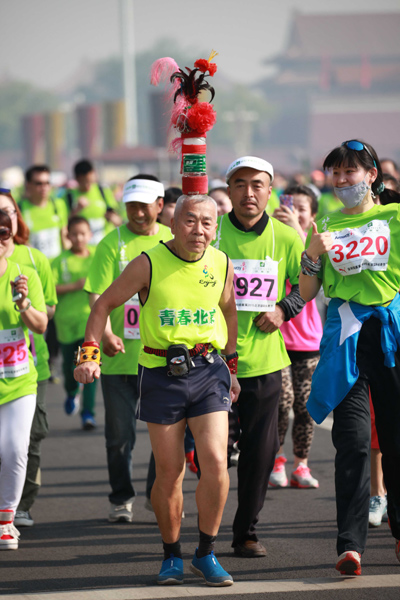 |
|
A senior citizen participates in an international running festival in April. The life expectancy of Beijing's permanent residents reached almost 82 years last year. [Chen Jiannan / for China Daily] |
The life expectancy of Beijing's permanent residents hit a record high last year - nearly 82 years - while the number of people 60 or older in the city increased by more than 200,000, a new report says.
A rapidly aging population, coupled with an increase in the number of children 10 or younger - the result of a rising birthrate in recent years - is putting an added burden on Beijing's working population, said the report, released on Monday by the Beijing Commission of Health and Family Planning.
The life expectancy of Beijing's permanent residents was almost 82 years last year, an increase of one-third of a year from 2013, and it is still slowly rising, the report said.
Female life expectancy was about 84 years, more than four years above males, the report said. The life expectancy for both men and women in Beijing are among the highest in China, the report said.
Last year, the number of people 60 or older in Beijing reached 3.01 million, accounting for 22.6 percent of the city's total population with hukou, or household registration. Of that number, 2.04 million people are 65 or older.
By comparison, the number of people age 60 or above in Beijing was 2.8 million at the end of 2013, said a report released last year by Beijing's authority for senior affairs.
Yuan Xin, a professor of population studies at Nankai University in Tianjin, said that Beijing, like many other places in China, has a population that is expected to live longer because of improved healthcare.
The average life expectancy in China was 75 years in 2012, six years longer than it was in 1990, according to a report on global health released by the World Health Organization last year.
Heavier burden
Meanwhile, the number of children 10 years or younger in Beijing has been increasing in recent years, putting a heavier burden on Beijing's working population, the report said.
Yuan, from Nankai University, said the increase in the number of children is in part due to the nation's relaxation of family planning policies in recent years, and also a result of the previous major birth peak in China, with couples born in the 1980s and 1990s now entering the peak period of childbirth.
Since February last year, Beijing has allowed couples in which either is a single child to have a second child. Before that, couples were allowed to have a second child only if both were a single child.
